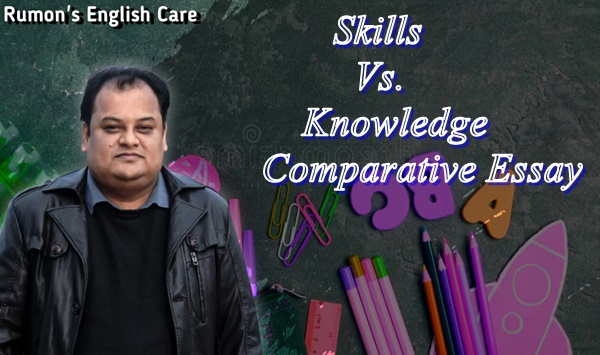Skills Vs. Knowledge
Skills vs. Knowledge
Knowledge, skills, and values are essential elements of our personal and professional growth. They are the building blocks that shape us into competent individuals who can contribute positively to society. Throughout our lives, we acquire knowledge, develop various skills, and adopt values that we apply in different situations. In this essay, I will discuss the importance of learning and applying knowledge, skills, and values in our lives.
The differences between knowledge and skills are principally what and how you learn.
Knowledge implies something ‘theoretical’ and refers to information about a given topic that you learn from books, newspapers, magazines, encyclopedias, internet, or school/college.
Skills imply something ‘practical’ and refer to the application of theoretical information in practice and in the workplace.
Knowledge
A commonly used definition of knowledge, according to Wikipedia, reads as follows:
‘Knowledge is a familiarity, awareness, or understanding of someone or something, such as facts, information, descriptions, or skills, which is acquired through experience or education by perceiving, discovering, or learning.’
Knowledge generally implies theoretical understanding and is something that can be passed on from generation to generation in many ways, for example books, magazines, archives, schools, and colleges.
A characteristic of knowledge is that it’s forever growing as we conduct new research and build upon what we already know. It has true value when it’s shared with others and they too can take advantage of this knowledge.
It’s a vital, theoretical building block for acquiring and mastering skills.
Skills
A skill is the ability to perform a certain task or role. It relates to application of knowledge in a particular situation or context, as it requires that you use previously acquired knowledge or information. Generally speaking, it implies that some form of practice is required to hone the skill.
Beside knowledge, mastering a certain skill requires experience.
It’s this combination of knowledge and experience that allow you to perform a task or role to the best of your ability. Together with knowledge and attitude, skills also form the basis of competences.
First and foremost, acquiring knowledge is crucial for personal development. Knowledge can be gained through formal education, reading, or personal experiences. It enhances our understanding of the world and enables us to make informed decisions. For example, learning about various cultures, history, and different perspectives can foster empathy and tolerance. Additionally, knowledge provides us with the tools to critically analyze information and think logically. These skills are particularly important in today’s world, where misinformation is widespread, and critical thinking is vital to differentiate between facts and opinions.
Furthermore, skills play a significant role in our personal and professional lives. They allow us to carry out specific tasks efficiently and effectively. Skills can be acquired through training, practice, and experience. For instance, communication skills enable us to express our thoughts and ideas clearly, build relationships, and resolve conflicts. Leadership skills help us inspire and motivate others to achieve common goals. Additionally, problem-solving and analytical skills allow us to identify and overcome challenges in both personal and professional settings. Developing and applying such skills not only benefits us individually but also contributes to our success in various areas of life. Moreover, values are fundamental in shaping our character and guiding our behavior. Values are the principles and beliefs that are deeply ingrained in us. They determine our priorities, influence our decisions, and define our ethical standards. For example, values such as honesty, integrity, and empathy enable us to build trust with others and maintain strong relationships. Moreover, values like respect and inclusivity promote a harmonious and diverse society. By applying these values in our interactions and decision-making processes, we contribute to the creation of a better world.
In conclusion, the knowledge, skills, and values we acquire and apply throughout our lives are essential for personal and professional growth. They provide us with a solid foundation to navigate through challenges and seize opportunities. By continuously learning and developing our knowledge, skills, and values, we become well-rounded individuals who can make meaningful contributions to society. Embracing the importance of lifelong learning and application of these elements will enable us to lead fulfilling lives and create positive change in the world.

